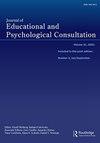An Exploratory Comparison of Three Treatment Fidelity Assessment Methods: Time Sampling, Event Recording, and Post-observation Checklist
IF 1.1
4区 心理学
Q4 PSYCHOLOGY, EDUCATIONAL
Journal of Educational and Psychological Consultation
Pub Date : 2021-07-03
DOI:10.1080/10474412.2020.1777874
引用次数: 5
Abstract
ABSTRACT When assessed, treatment fidelity is most often evaluated by checklists of intervention steps after an observation session, though estimates can vary depending on how intervention steps are operationalized and rated. A more straightforward approach may involve the adoption of direct observation methods such as time sampling or event recording, which are regularly used to evaluate student behavior. This study explores the utility of using time sampling and event recording in comparison to the traditional post-observation checklist method. Five paraeducator consultees’ treatment fidelity of behavior support plans for students with autism was assessed by post-observation ratings. In addition, 15-sec whole-interval recording of treatment fidelity across intervention steps and event recording of prompts (an intervention step for all plans) were collected throughout the observation session. To compare treatment fidelity data, we present visual analysis, associated quantitative metrics, and correlations. Implications for future treatment fidelity assessment research and consultation practice are described.时间抽样、事件记录和观察后检查表三种治疗保真度评估方法的探索性比较
在评估时,治疗保真度通常是通过观察后的干预步骤清单来评估的,尽管估计可能会因干预步骤的操作和评级而有所不同。一种更直接的方法可能包括采用直接观察方法,如时间采样或事件记录,这些方法通常用于评估学生的行为。本研究探讨使用时间抽样和事件记录的效用,比较传统的观察后清单方法。采用观察后评分法对5名辅助教育者对自闭症学生行为支持计划的治疗保真度进行评估。此外,在整个观察过程中收集跨干预步骤的15秒治疗保真度全间隔记录和提示事件记录(所有计划的干预步骤)。为了比较治疗保真度数据,我们提出了视觉分析、相关的定量指标和相关性。本文描述了对未来治疗保真度评估研究和咨询实践的影响。
本文章由计算机程序翻译,如有差异,请以英文原文为准。
求助全文
约1分钟内获得全文
求助全文
来源期刊

Journal of Educational and Psychological Consultation
PSYCHOLOGY, EDUCATIONAL-
CiteScore
3.40
自引率
23.50%
发文量
20
期刊介绍:
The Journal of Educational & Psychological Consultation (JEPC) provides a forum for improving the scientific understanding of consultation and for describing practical strategies to increase the effectiveness and efficiency of consultation services. Consultation is broadly defined as a process that facilitates problem solving for individuals, groups, and organizations. JEPC publishes articles and special thematic issues that describe formal research, evaluate practice, examine the program implementation process, review relevant literature, investigate systems change, discuss salient issues, and carefully document the translation of theory into practice.
 求助内容:
求助内容: 应助结果提醒方式:
应助结果提醒方式:


